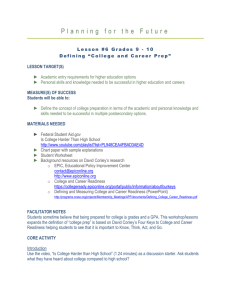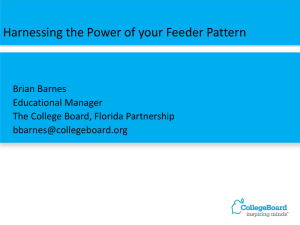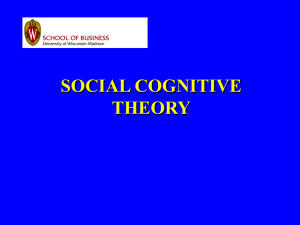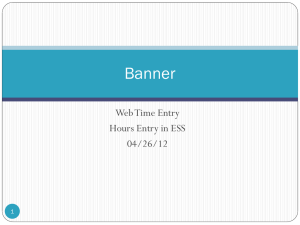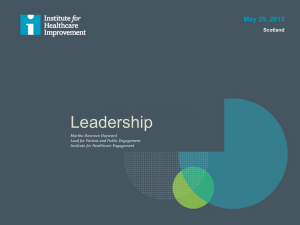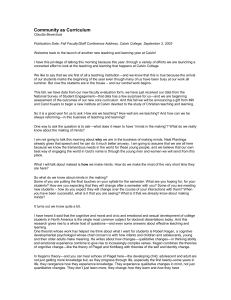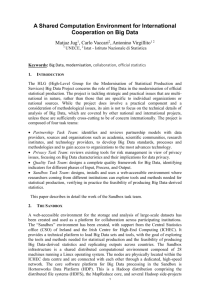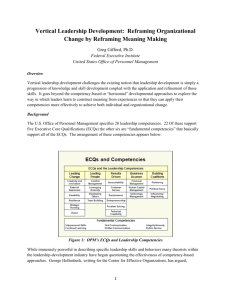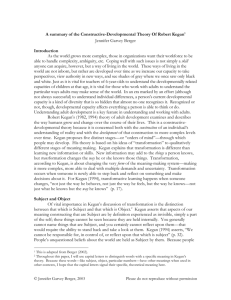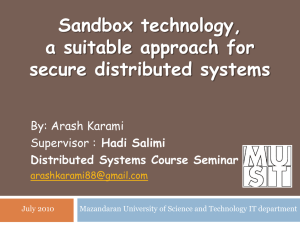Powerpoint Introduction to the Workshop
advertisement
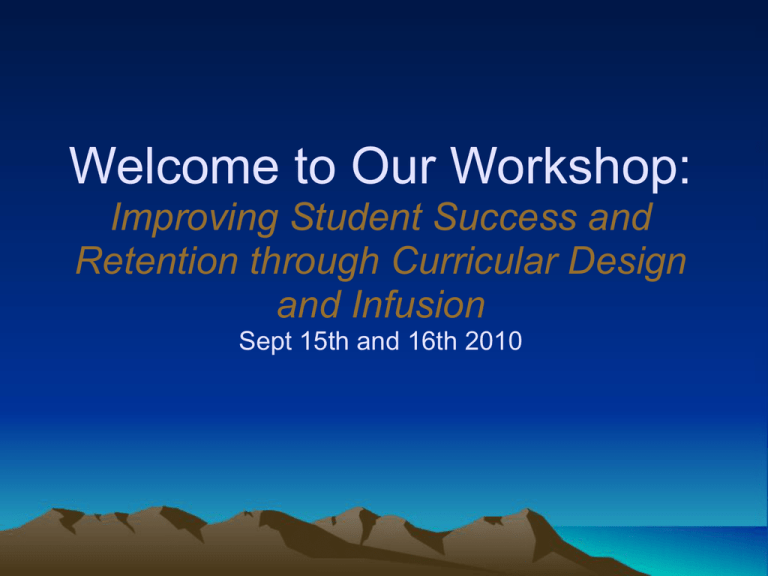
Welcome to Our Workshop: Improving Student Success and Retention through Curricular Design and Infusion Sept 15th and 16th 2010 Brought to you by…. • Title III Department of Education Engaging Students grant • Learning Communities • Language, Lit and Communication Unit Plan Who am I? • Anne McGrail o o o English Faculty Learning Communities Coordinator Title III Engaging Students Grant Activity Director What You Will Need • Syllabus and learning outcomes/objectives for the course you are developing (bring tomorrow if not today) • Articles emailed to you (also on moodle) • On Course textbook for reference (we are focusing on Chapters 2 and 4) • And patience…. Participation Structures • SOLO (often we begin by thinking and writing alone) • DISCIPLINE AND “NEIGHBORDISCIPLINE” GROUPS • INTERDISCIPLINARY GROUPS • WHOLE GROUP Our Goal: Shared Curriculum • Two moodle sites: Resource and “Sandbox” • Log into classes.lanecc.edu • “Faculty Workshop Sandbox” • “Curriculum Development Resources for Student Successs” Moodle sites • Share your ideas with colleagues and develop a “bank” of infusions • Consult Curriculum Devt. Resource site at any time • “Sandbox” site is for posting curriculum begun or developed during workshop • Each faculty member has a named course block—but groups should feel free to revise and post as “collectives” $$$ How to Get Paid $$$ • Sign the log-in sheet each day and include your L# • Post your curriculum infusion(s) ideas to the sandbox to share with faculty colleagues • Post your hours onto your timesheet: English faculty post to regular timesheet ABSE faculty post to “Learning Communities timesheet” o All others will post to a “Title III/First Year Experience” timesheet o o Framework for Workshop: Conley’s “Facets of College Readiness” and College Success • Open access college • Huge variation in student preparedness • Students are in college but many not ready to be here • Conley’s research offers an holistic view of the complex factors that “add up” to success Infusion and Integration: Concrete, Incremental Changes to Your Curriculum • Moving from implicit expectation to explicit discussion and in-class activity • Moving from disappointment at student deficit to anticipating and planning for their level of “college knowledge,” offering opportunities for them to develop • Emphasizing students’ responsibility Our expectations of students: they should be comfortable thinking abstractly, they are able to form mutual peer relationships, o they are responsible for their own learning, o they can reflect readily on their own thoughts, and act on their guiding thoughts o o The “Self-Authoring Mind” • Robert Kegan’s work • “Higher education is a bridge to the ‘selfauthoring mind’” • Helping students involves academic and social/psychological dimension • We can anticipate and prepare for students’ bewilderment rather than be merely disappointed and frustrated by it What are the Facets of College Readiness? • We all recognize them • David Conley’s outlines them in “Redefining College Readiness” and College Knowledge 1.Key Cognitive Strategies 2.Key Content Knowledge 3.Academic Behaviors for College Success 4.Contextual Skills and Awareness 1. Key Cognitive Strategies • Students like stability, are intellectually drawn to generalizations and may be content with ideals and values they have always held (Kegan) • Students need to move from a preference and dependence on concrete thinking, limited points of view, and enduring dispositions, needs and preferences 1. Key Cognitive Strategies (cont’d) • Students need to move toward cognitive strategies that challenge and stretch these preferences and habits • Higher tolerance for intellectual openness, inquisitiveness, analysis, reasoning, argumentation and proof • Need to develop skills in interpretation (vs. “you’re reading too much into it”) 1. Key Cognitive Strategies (cont’d) • Students need to develop habits of precision and accuracy (rather than generalizations that bring them comfort) • Problem-posing and problem-solving mind-set 2. Key Content Knowledge • Key structures, concepts and knowledge of academic life • Readiness assumes preparation in writing, research, math, science, social science and world languages. • Classes may have huge variations in preparedness, making course outcomes hard to achieve across all student groups. 2. Key Content Knowledge • For many faculty, key content knowledge is their passion • Frustration comes when we can’t “get to” the best content because students are underprepared 3. Academic Behaviors for College Success • Developing our skills in recognizing and fostering the necessary academic behaviors for students’ success • Under this heading lie the key components of the college success (CG100) curriculum • Fast Lane to Success and other First Year Learning Communities embed this curriculum College Success Curriculum • Skip Downing’s On Course curriculum includes strategies and advice for students • Helps students understand their own goals and take steps to achieve them; o Take responsibility for their own learning; o Learn how to make wise choices at each stage of their academic and life journey o Integration of Success Principles Across the Curriculum • While we are not counselors, each of us can use engaging pedagogical strategies, classroom activities and homework assignments to support students’ developing self-awarenss and selfresponsibility 3. Academic Behaviors for College Success (cont’d) • • • • Self-monitoring and metacognitive abilities Understanding ones own blind spots (Knowledge Surveys) Tendency to persist when confronted with a difficult task • Ability to identify and employ a number of learning activities • Ability to transfer learning strategies from familiar to unfamiliar contexts 3. Academic Behaviors for College Success (cont’d) • Mastery of study skills beyond reading and answering questions • Time management • Using information resources • Note taking • Communication with advisors • Balancing social and academic life 4. Contextual Skills and Awareness • Help students to understand how a college operates as a system and a culture • Means WE need to make explicit to ourselves and our students the implicit cultural values and rules in our disciplines and in academic culture—it cannot be assumed! • Downing’s “College Customs” pp. 24-26 4. Contextual Skills and Awareness (cont’d) • Norms, values and conventions of interactions in a college context • Going beyond writing it in the syllabus— helping students to live these norms and values and internalize them as their own. • Human relations skills to cope with and adapt to the college system (often radically different from the community in which they were raised [Conley 13]). 4. Contextual Skills and Awareness • “College Knowledge”—the stated and unstated processes necessary to navigate the system. • How do these processes intersect with your sphere of influence? • Pre-registration and advising, financial aid calendar, recommendations, mid-term schedules, grades, add/drop decisions, prerequisites, key courses/gateway courses, progression to degree, etc. Fostering the “self-authoring mind” “As educators, our job is to disappoint students’ expectations at a rate they can stand.” Robert Kegan, The Evolving Self
